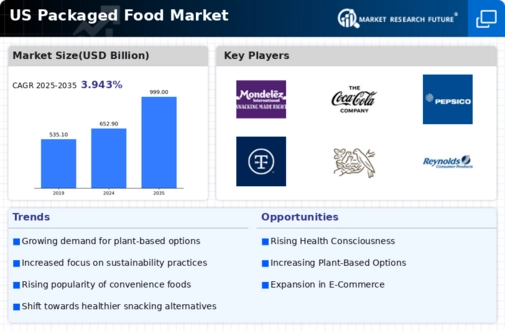Rise of Convenience Foods
The fast-paced lifestyle of modern consumers is significantly influencing the health wellness-packaged-food market. As individuals seek convenient meal solutions that do not compromise on health, the demand for ready-to-eat and easy-to-prepare packaged foods is on the rise. Recent data indicates that the convenience food segment within the health wellness-packaged-food market has grown by 20% in the last year. This growth is attributed to the increasing number of working professionals and busy families who prioritize time-saving options. Manufacturers are responding by developing products that are not only nutritious but also quick to prepare, thus appealing to the needs of consumers who desire both health and convenience.
Increasing Health Consciousness
The The health-packaged-food market is experiencing a surge in demand due to growing awareness of health and nutrition among consumers. As individuals become more informed about the impact of diet on overall well-being, they are increasingly seeking products that align with their health goals. This trend is reflected in the market, where sales of health-oriented packaged foods have risen by approximately 15% over the past year. Consumers are gravitating towards options that are low in sugar, high in protein, and rich in essential nutrients. This shift in consumer behavior is prompting manufacturers to innovate and expand their product lines to cater to this health-conscious demographic, thereby enhancing the overall growth of the health wellness-packaged-food market.
Sustainability and Ethical Sourcing
Sustainability is becoming a pivotal factor influencing the health wellness-packaged-food market. Consumers are increasingly concerned about the environmental impact of their food choices and are favoring products that are sustainably sourced and produced. This trend is evident in the growing demand for organic and ethically sourced ingredients, which has led to a 15% increase in sales of such products within the health wellness-packaged-food market. Manufacturers are responding by adopting sustainable practices, such as reducing packaging waste and sourcing ingredients from responsible suppliers. This commitment to sustainability not only appeals to environmentally conscious consumers but also enhances brand loyalty, thereby contributing to the overall growth of the health wellness-packaged-food market.
Growing Interest in Functional Foods
The health wellness-packaged-food market is witnessing a rising interest in functional foods, which are products that offer additional health benefits beyond basic nutrition. Consumers are increasingly seeking foods that support specific health outcomes, such as improved digestion, enhanced immunity, and better mental health. This trend is reflected in the market, where functional foods have seen a growth rate of approximately 12% over the past year. As awareness of the benefits of probiotics, omega-3 fatty acids, and other functional ingredients increases, manufacturers are incorporating these elements into their packaged food offerings. This shift not only caters to consumer preferences but also drives innovation within the health wellness-packaged-food market.
Technological Advancements in Food Production
Innovations in food technology are playing a crucial role in shaping the health wellness-packaged-food market. Advances such as improved preservation techniques, enhanced nutritional profiling, and the use of natural ingredients are enabling manufacturers to create healthier products that meet consumer demands. For instance, the introduction of new packaging technologies has extended shelf life while maintaining the nutritional integrity of food. This has led to a 10% increase in the availability of health-focused packaged foods in retail outlets. As technology continues to evolve, it is likely that the health wellness-packaged-food market will see further enhancements in product quality and variety, catering to an increasingly discerning consumer base.

















